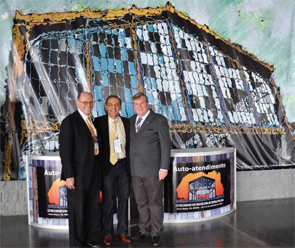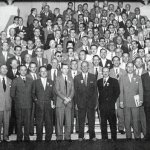

The world is getting smaller, and to advance rheumatology, collaboration from rheumatology health professionals and organizations worldwide is required. Last month, “From the College” featured an article, “ACR Members Help Educate Rheumatologists Around the World.”1 In light of that article and the importance of strengthening relationships throughout the rheumatology world, I am taking the opportunity to provide an update on the other rheumatology leagues and how through collaboration with the ACR, advancing rheumatology is a worldwide initiative.
EULAR
The European League Against Rheumatism (EULAR) is a pan-European organization that fosters a multitude of activities in areas of research, patient care, and education. The ACR and EULAR collaborate primarily on criteria development. The two organizations began discussing working together on classification and response criteria in 2005, with the recognition that the optimal model for developing and using criteria crosses national and continental borders. After taking some time to carefully consider each organization’s goals and processes, as well as ongoing rheumatology criteria work, the ACR and EULAR published an initial joint editorial—”Rheumatology Gone Global”—in October 2008, alongside a joint rheumatoid arthritis (RA) trial guidance manuscript.2,3
Since 2008, the ACR and EULAR have worked together on several criteria projects, including RA classification and RA remission, which were published in September 2010 and March 2011, respectively.4,5 Polymyalgia rheumatica classification criteria are expected to be published by the end of this year. Other ongoing collaborations include classification criteria for scleroderma, vasculitis, myositis, and gout, as well as an evaluation of best practices for early inflammatory arthritis, including diagnosis and treatment. Current EULAR President, Maxime Dougados, MD, says, “Continued collaboration between two international societies such as ACR and EULAR can only improve EULAR’s ‘core mission’; that is, to forward the clinical, educational, and research endeavors of rheumatologists all over the world.” The ACR and EULAR will continue to proactively consider new criteria development projects with input from the rheumatology community.
PANLAR
The Pan American League of Associations of Rheumatology (PANLAR) contains groups of rheumatic scientific societies, health professionals, and patient associations in all countries in the Americas (North, Central, and South). PANLAR was established in 1944. The ACR joined as a member when we were the American Rheumatism Association and remains an active member of PANLAR today. Currently, PANLAR is in the process of establishing a more formal administrative structure that should lead to better identification and unification for rheumatology throughout the Americas. The ACR’s relationship with PANLAR also has an educational component. For more than 20 years, the ACR has been developing a review course for PANLAR’s Congresses, which are now held every two years.
In 2010, Stanley Cohen, MD, immediate past president of the ACR, attended the PANLAR biennial meeting held in Santiago, Chile. Dr. Cohen spoke of the sizeable attendance at the meeting, along with quality of the presentations. In 2011, I represented the ACR in honoring a fellow member of PANLAR at the opening ceremony celebrating the 50th year of the Mexican College of Rheumatology, the 39th annual meeting of that College, and the Second Bi-National Mexico Canada Congress, held in Cancun. As part of the pre-Congress program, I had an opportunity to lecture on rheumatology and pain therapy and, subsequently, to present certificates to a distinguished group of Hispanic ACR Masters who were lecturing at the Congress. The audience for this anniversary meeting was large and enthusiastic for the opportunity to learn the most current advances in rheumatic disease care. Current PANLAR President, Antonio Carlos Ximenes, MD, from Brazil, sums up the importance of collaboration within the membership of PANLAR by quoting Anibal Ruiz Moreno, MD: “It is necessary to make one out of the Americas if we want to achieve anything in rheumatology.”
APLAR
Rohini Handa, MD, current president of the Asian Pacific League Against Rheumatism (APLAR), shared his thoughts on the importance of a worldwide rheumatology collaboration. “Collaboration brings together not only physicians but also patients on a common platform so that we can exchange, update, innovate, and learn from one another,” he says. “This is especially true for a challenging specialty like rheumatology.” APLAR strives to bring together rheumatology in the Asia Pacific region to fight as one against arthritis. An initiative for APLAR that stresses the need to improve the diagnosis and treatment of RA through education is “Every Day Counts.”6 Housed on APLAR’s website, the initiative offers a RA patient fact sheet to assist in educating APLAR’s rheumatology patients. In addition, the ACR has been assisting APLAR in preparation of rheumatology review courses as part of their scientific meetings.
AFLAR
The African League Against Rheumatism (AFLAR) brings together associations of rheumatologists across the African continent with the aim of significantly improving the outcome of musculoskeletal disorders among its diverse populations. In his presidential address, Omondi Oyoo, MD, current president of AFLAR, spoke with his membership on how to improve the outcome of musculoskeletal disorders with the scarce resources available in Africa. He stressed the importance of being collectively engaged in operational research and device integrated care of chronic diseases in a manner that will maximize outcomes with the minimum possible expenditure of resources. He noted that, “since the world is now a global village, we also need to collaborate fruitfully with other well-endowed leagues so that we can gain from their resources and experiences.”
Apply for ACR/EULAR Funding
ACR members who are interested in submitting a proposal to the ACR and EULAR for possible joint funding and support should be on the alert for the next joint call for proposals, which will be announced by late August. The call will be available on the ACR website and will be e-mailed to all ACR members directly.
ILAR
The importance of a global collaboration of the rheumatic disease societies was addressed in 2008, when the International League Against Rheumatism reincorporated as the International League of Associations for Rheumatology (ILAR). The reincorporation led to a more focused mission to advance rheumatology in developing countries. ILAR’s executive committee consists of the presidents and presidents-elect of the ACR, AFLAR, APLAR, EULAR, and PANLAR. The group generally meets at the ACR annual meeting and at EULAR’s annual congress. The collaboration of the leaders of the ACR and the rheumatology leagues has resulted in a renewed commitment to support programs that lead to progress in the practice and education of rheumatology in countries where there is an exceptional need, focusing specifically on developing countries. Since the reincorporation, ILAR has provided over $300,000 in funding to projects developed to advance the education and clinical practice of rheumatology in areas of the world where there is a need, including India, Zambia, Macedonia, Morocco, and the Philippines. Currently, ILAR is accepting project proposals for the 2012 fiscal year; the proposal form can be found on ILAR’s website, www.ilar.org.
The independent and collaborative efforts of the ACR and each league—AFLAR, APLAR, EULAR, and PANLAR—are all important in the pursuit to advance rheumatology. Interacting with the members of the other leagues gives the ACR the opportunity to share rheumatic disease knowledge and administrative expertise with rheumatologists from around the world. Having an ongoing dialogue within the ACR and among all the rheumatology leagues provide opportunities to improve research, education, and quality for rheumatology health professionals and their patients. These international efforts are making the world smaller after all.
Dr. Borenstein is clinical professor of medicine in the division of rheumatology at George Washington University Medical Center, in Washington, D.C., and in private practice at Arthritis and Rheumatism Associates there. Contact him via e-mail at [email protected].
References
- ACR members help educate rheumatologists around the world. The Rheumatologist. 2011;5(6): p. 22-23.
- Solomon DH, Tyndall A, Gabriel SE, Dougados M. Rheumatology gone global. Arthritis Rheum. 2008;59:1369-1370.
- Aletaha D, Landewe R, Karonitsch T, et al. Reporting disease activity in clinical trials of patients with rheumatoid arthritis: EULAR/ACR collaborative recommendations. Arthritis Rheum. 2008;59:1371-1377.
- Aletaha D, Neogi T, Silman AJ, et al. 2010 Rheumatoid arthritis classification criteria: An American College of Rheumatology/European League Against Rheumatism collaborative initiative. Arthritis Rheum. 2010;62:2569-2581.
- Felson DT, Smolen JS, Wells G, et al. American College of Rheumatology/European League Against Rheumatism provisional definition of remission in rheumatoid arthritis for clinical trials. Arthritis Rheum. 2011;63:573-586.
- APLAR. Every Day Counts. Available online at www.aplar.org/Education/Pages/EveryDayCounts.aspx. Accessed July 15, 2011.
